“The ban on visitors really had a negative impact on the well-being of nursing home residents”
At the beginning of the COVID-19 pandemic, Professor Jan Hamers received a phone call from the Dutch Ministry of Health, Welfare and Sport. They asked the Living Labs in Ageing and Long-Term Care to help develop visiting guidelines for nursing homes, which had immediately been closed to all visitors when coronavirus hit the Netherlands. “Thanks in part to our research, they reopened their doors to visitors earlier.”
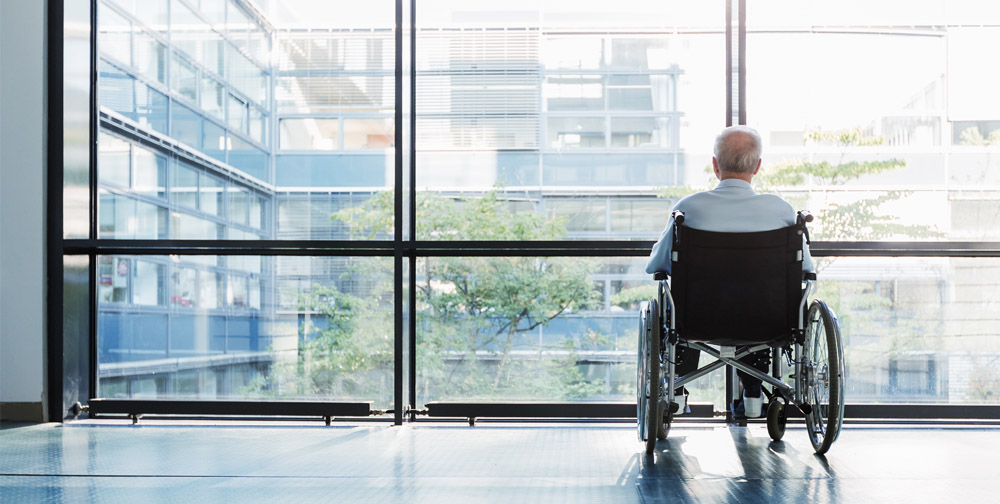
COVID-19 monitor in nursing homes
Jan Hamers (professor of Care of Older People): “Soon after the COVID-19 pandemic broke out last March, Minister De Jonge of the Ministry of Health announced a ban on visitors to nursing homes. Shortly afterwards, I received a phone call from the ministry. Their first question was whether the Living Labs in Ageing and Long-Term Care could help them collect data: how many people in nursing homes were infected with coronavirus? How many residents, how many employees? They had no insight into those figures. And then there was the question of how to proceed, of course. I passed their request on to SANO, the network of Academic Collaborative Centres for Care of Older People. Amsterdam started working on those figures, Leiden and Groningen set out to analyse the meeting notes of nursing home crisis teams, and our own Living Lab in Ageing and Long-Term Care Limburg (AWO-L) teamed up with the Nijmegen University Knowledge Network for Care of Older People (UKON) to study the ban on visitors.
Overestimated
“The ban was having a very significant impact, as we quickly learnt from both residents and their loved ones. After all, what is worse: not seeing your partner in person for three months, a mother with dementia no longer recognising her child after that amount of time – or the risk of getting infected with coronavirus? It was quite possible that people were willing to take that risk. Moreover, the number of cases in nursing homes had been overestimated; only half of all suspected cases were confirmed, and three or four out of every ten patients died. You might say that’s a lot, but we shouldn’t forget that this is the most vulnerable group of people. The average life expectancy in a nursing home is eighteen months. I’d prefer to look at it the other way around: 60 to 70 per cent of those patients survived the virus.”
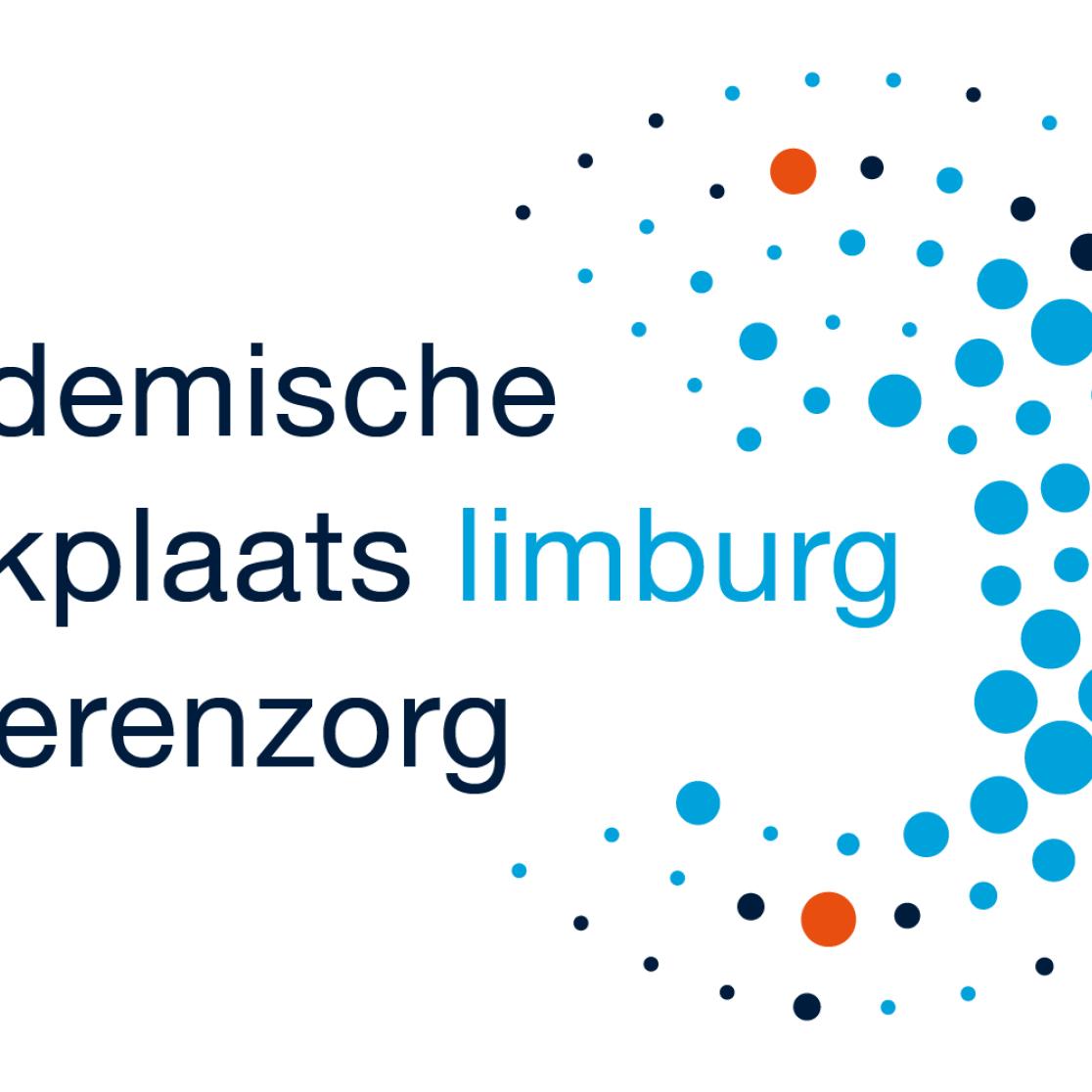
- Start project: May 2020
- Project website: www.academischewerkplaatsouderenzorg.nl
Pilot study
“We wanted to do a small-scale pilot study into allowing one visitor at a time, under strict conditions. We would monitor the visits. People were increasingly calling for the restrictions to be eased, so the minister decided that one nursing home in each Dutch safety region could participate – that’s 25 in total. At the end of May 2020, the general ban on visitors was lifted, under certain conditions. By that time, we were monitoring 76 nursing homes using questionnaires – the general monitor – and conducting in-depth monitoring at five homes, interviewing the people affected by the ban. These interviews were very emotional at times, particularly the ones with family members who were finally allowed to visit their loved ones again. They had been suffering terribly and were so relieved that the ban had been lifted, just like the residents themselves. The ban really had a negative impact on people’s well-being. Importantly, the study didn’t lead to any additional cases. Zero. We also found that visitors were quite capable of following the instructions. The only thing they struggled with was avoiding physical contact. The situation remained stressful for employees, though: they continued to experience high levels of work pressure and were still worried that people would get infected with coronavirus.”
Never again
“In June, the ministry asked us to report on the lessons learnt. We passed this request on to nursing home administrators and our older adult advisory council at AWO-L, which includes representatives of client councils as well as representatives of the older adult advisory council of the Ministry of Health. They all said: never impose a general ban on visitors again, and let the homes develop their own visitation policies. So that’s what happened in September and October 2020. We were on our third round of collecting data when the second wave hit, with outbreaks in 25 per cent of Dutch nursing homes. This time, the minister didn’t impose a general ban on visitors; he left it up to the homes, as we’d advised. We checked with nursing home administrators, who said they weren’t planning to close their doors to visitors again. You never know, though – in the spring of 2021, some of them did so anyway.
But the government didn’t impose a general ban on visitors again, and I think our research contributed to that. Internationally as well: we published our findings in an American journal, JAMDA, which even gave us an award because the article got so many hits in the US and the UK. It said: see, nursing homes don’t have to close their doors to visitors.”
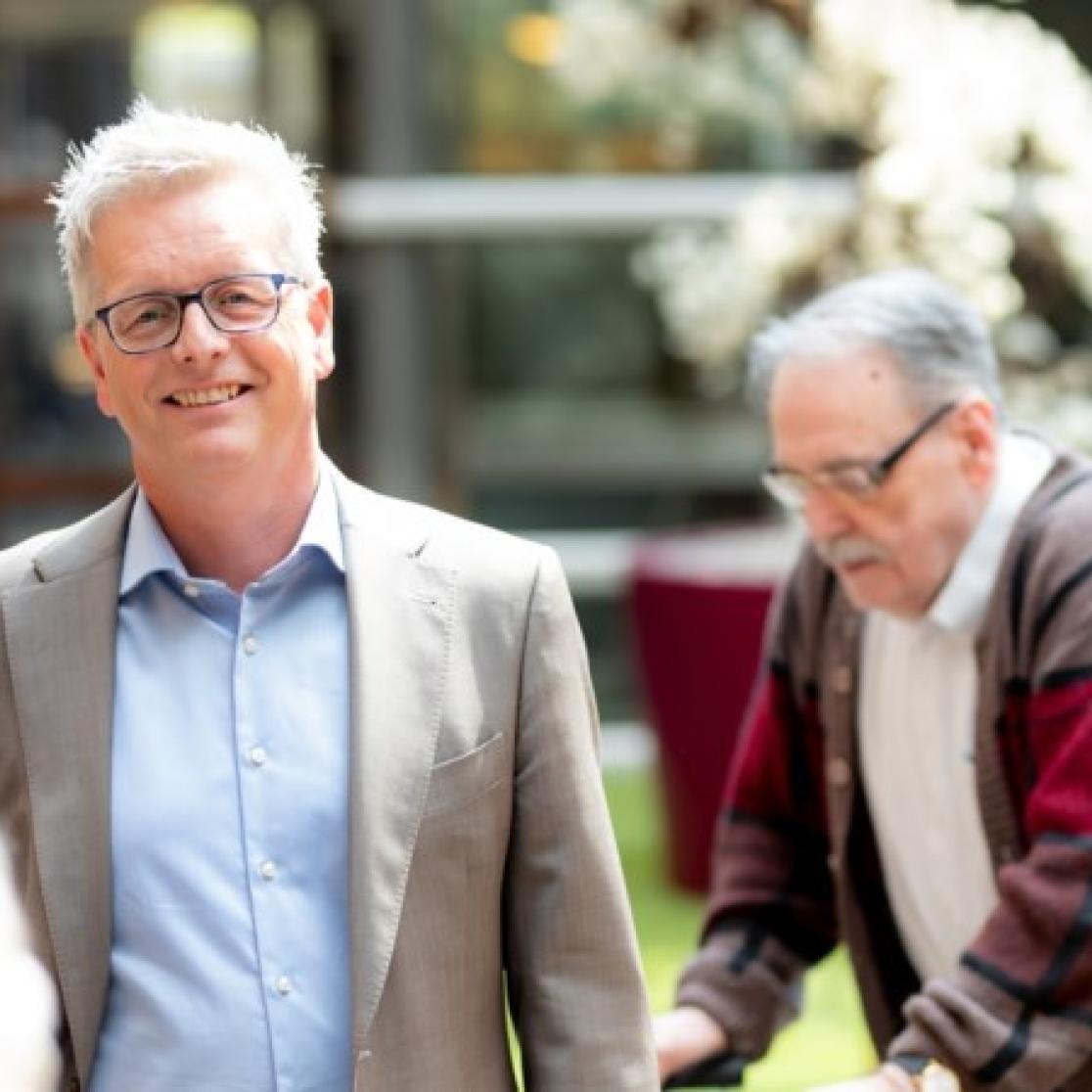
Contact
Principal investigator: Prof.dr. Jan Hamers
jph.hamers@maastrichtuniversity.nl
Still reluctant
In the spring of 2021, when about 80% of nursing home residents and 60 to 70% of nursing home employees had been vaccinated, the researchers went back to collect more data. They found that most nursing homes hadn’t further eased their visitation restrictions, despite these high vaccination rates. Nursing home residents also reported that they felt lonely due to the COVID restrictions. Says Jan Hamers, “This was reason for us to urge the care home sector to take the initiative and ease the restrictions after discussing it with residents, their loved ones, and employees. We knew that reopening the doors to visitors was the only way to improve the well-being of the residents.”
Reports
Report 1
Gradual and controlled easing of visitation restrictions at nursing homes: Week 1 impressions (in Dutch).
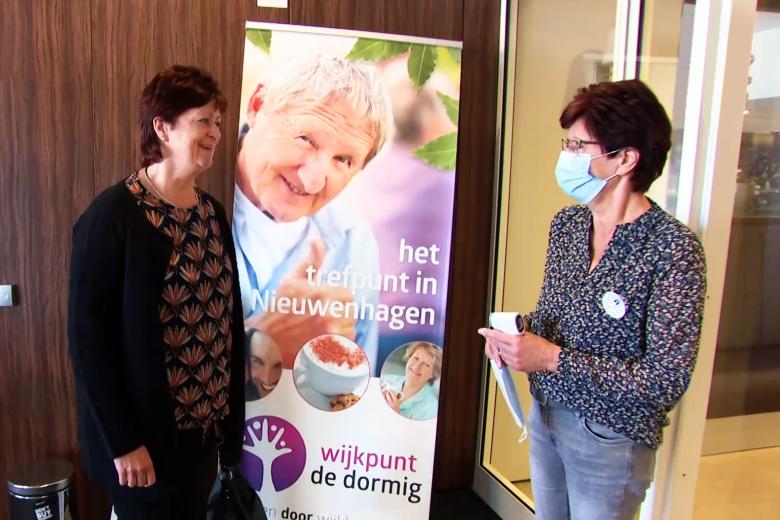
Report 2
“She was so happy to have visitors again”.
Experiences with easing the visitation restrictions at nursing homes (in Dutch).
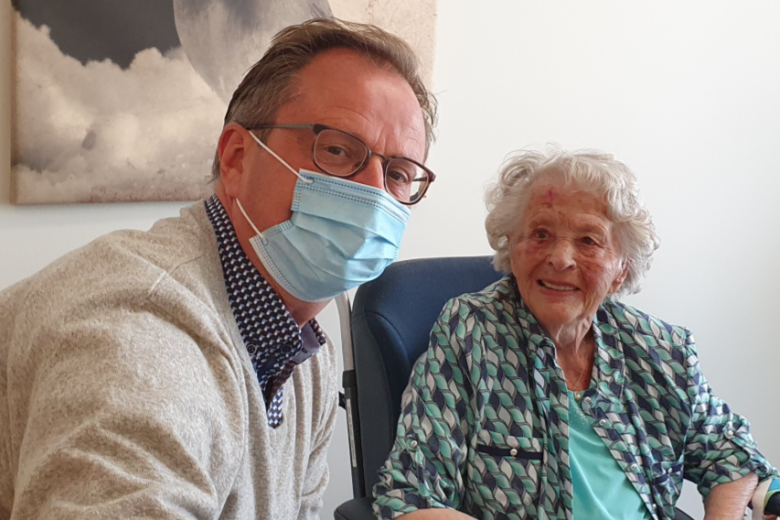
Report 3
“Ready for a new wave?”
Monitor following the easing of visitation restrictions at nursing homes (in Dutch).
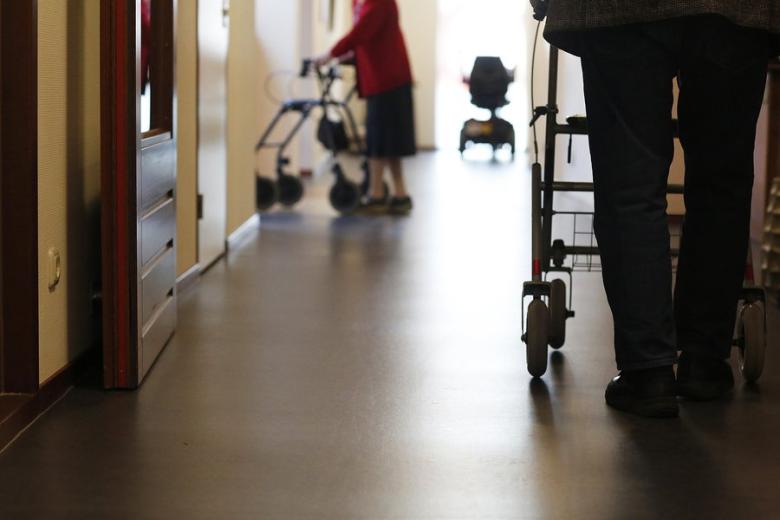
Report 4
"Vaccinated – now what?"
Monitor following the easing of visitation restrictions at nursing homes (in Dutch).
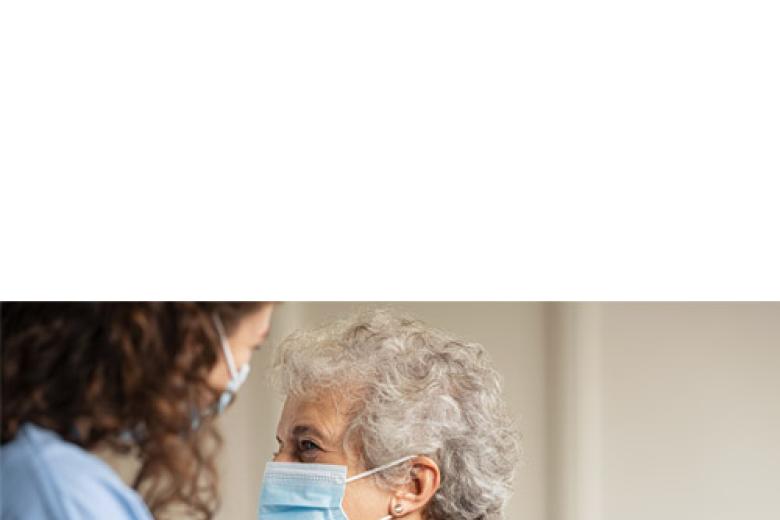
Report 5
"The pressure is high but we are in control".
Monitor following the easing of visitation restrictions at nursing homes (in Dutch)
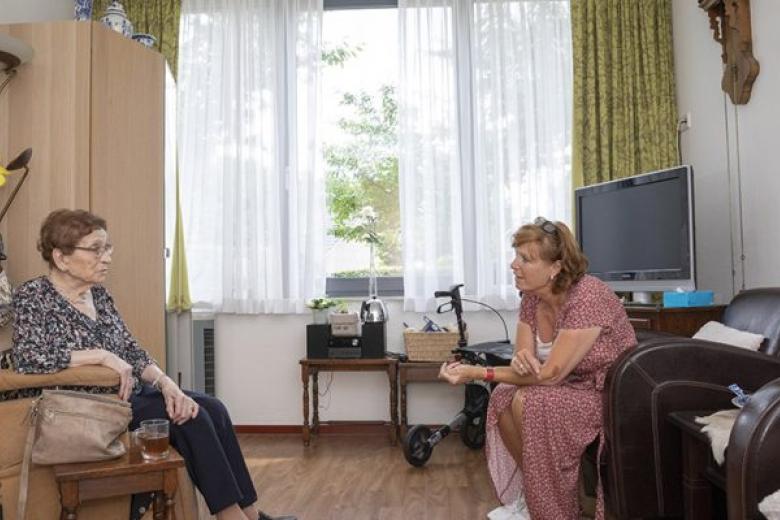
Partners
- Science network elderly care Nijmegen (UKON), Radboudumc
-
University Network Elderly Care - University Medical Center Groningen
-
Academic Collaborative Centers on Care for Older People (SANO)
-
Tranzo, Tilburg University
-
UNO Amsterdam, Amsterdam UMC
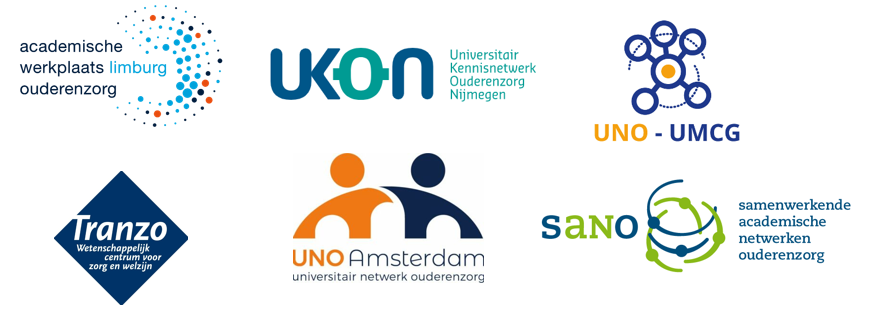
Project team
- Prof. dr. JPH Hamers, Maastricht University, Living Lab Ageing and Long-Term Care Limburg
- Prof. dr. RTCM Koopmans, Radboudumc, Science network elderly care Nijmegen (UKON)
- Prof. dr. DL Gerritsen, Radboudumc, Science network elderly care Nijmegen (UKON)
- Prof. dr. H Verbeek, Maastricht University, Living Lab Ageing and Long-Term Care Limburg
On behalf of the Academic Collaborative Centers on Care for Older People (SANO)
Involved Research Line
Involved Living Lab
In the Dutch media (selection)
21 April 2021
Most residents have been vaccinated, but nursing homes are still hesitant to ease restrictions:
Despite their high vaccination rates of about 80%, most nursing homes in the Netherlands have not yet embarked on a major easing of their visitation restrictions. The fourth report by the Living Lab in Ageing and Long-Term Care Limburg and UKON received a lot of media attention in the Netherlands.
NOS Radio 1 journaal
Dit is de Dag - NPO Radio 1
NRC Handelsblad
Limburg Centraal - L1

20 October 2020
Nursing home visitation remains a balancing act:
Are nursing homes ready for a new wave? How is the well-being of the residents? How much pressure are staff under? In the media, Jan Hamers explains the results of the study of the visitation policies of 76 nursing homes across the Netherlands after they reopened their doors to visitors.
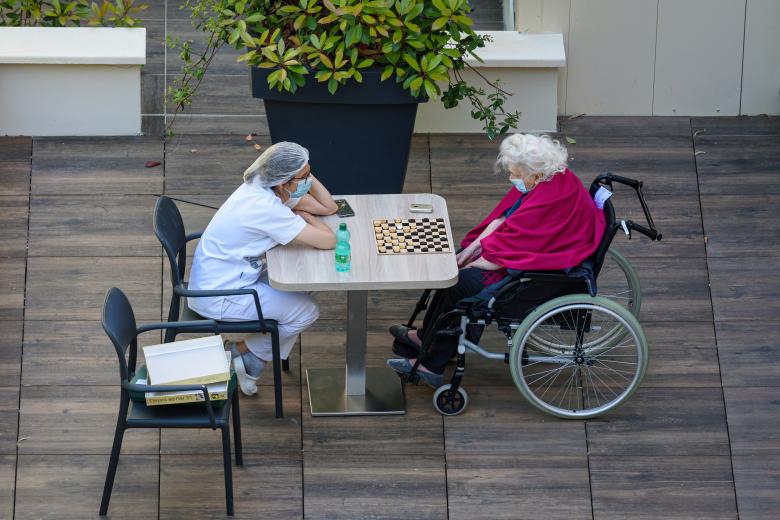
24 June 2020
Evaluating the easing of nursing home visitation restrictions:
Easing visitation restrictions did not lead to more COVID cases in the first nursing homes that were allowed to reopen their doors to visitors under very strict conditions. But easing the restrictions is difficult and time-consuming, and nursing home employees are worried about new outbreaks. In the media, Jan Hamers explains the results of the evaluation of easing nursing home visitation restrictions.
NOS journaal (vanaf minuut 6.09)
Nieuwssite van de NOS
Algemeen Dagblad
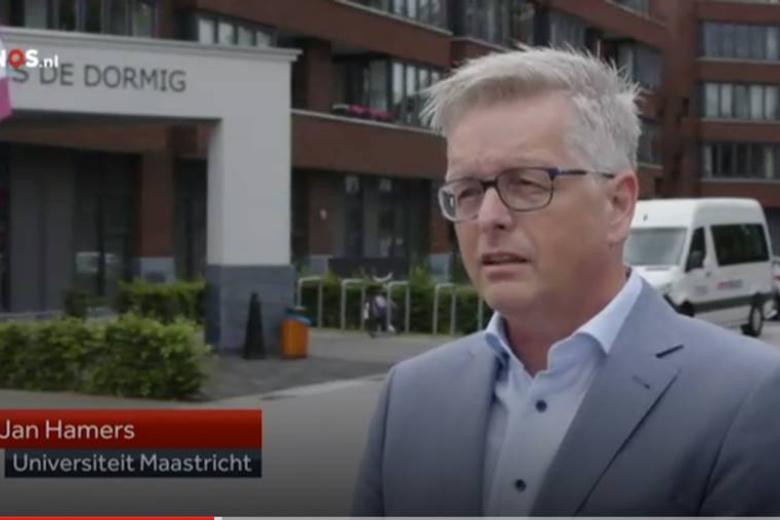
Webinar "Ready for a new wave?”
The webinar “Ready for a new wave?” (in Dutch) on 3 November 2020 wwas organised by the Living Lab Ageing and Long-Term Care Limburg in cooperation with Science network elderly care Nijmegen (UKON).
Our most important publications in scientific journals
-
Backhaus R, Verbeek H, de Boer B, Urlings JH, Gerritsen DL, Koopmans RT & Hamers JP. From wave to wave: a Dutch national study on the long-term impact of COVID-19 on well-being and family visitation in nursing homes. BMC Geriatrics 2021.
- Hilde Verbeek, Debby L Gerritsen, Ramona Backhaus, Bram S de Boer, Raymond T C M Koopmans, Jan P H Hamers. Allowing Visitors Back in the Nursing Home During the COVID-19 Crisis: A Dutch National Study Into First Experiences and Impact on Well-Being. Journal of the American Medical Directors Association. 2020 Jul;21(7): 900-904.
- Raymond T. C. M. Koopmans, Hilde Verbeek, Annemiek Bielderman, Meriam M. Janssen, Anke Persoon, Ivonne Lesman-Leegte, Eefje M. Sizoo, Jan P. H. Hamers, and Debby L. Gerritsen. Reopening the doors of Dutch nursing homes during the COVID-19 crisis: results of an in-depth monitoring. International Psychogeriatrics 2021 Apr 5;1-8
Abstracts/ presentations scientific conferences
- Gerritsen D, Backhaus R, De Boer B, Urlings J, Koopmans R, Hamers J, Verbeek H. The Impact of Visitation Guidelines During COVID-19 on Well-Being and Daily Life in Nursing Homes, Innovation in Aging, Gerontological Society of America, USA, 2021.
- Backhaus R, Urlings J, Verbeek H, de Boer B, Gerritsen D, Koopmans R, Hamers JPH. Impact of Covid-19 vaccinations Dutch nursing homes. Nordic Congress of Gerontology, Odense, Denmark.
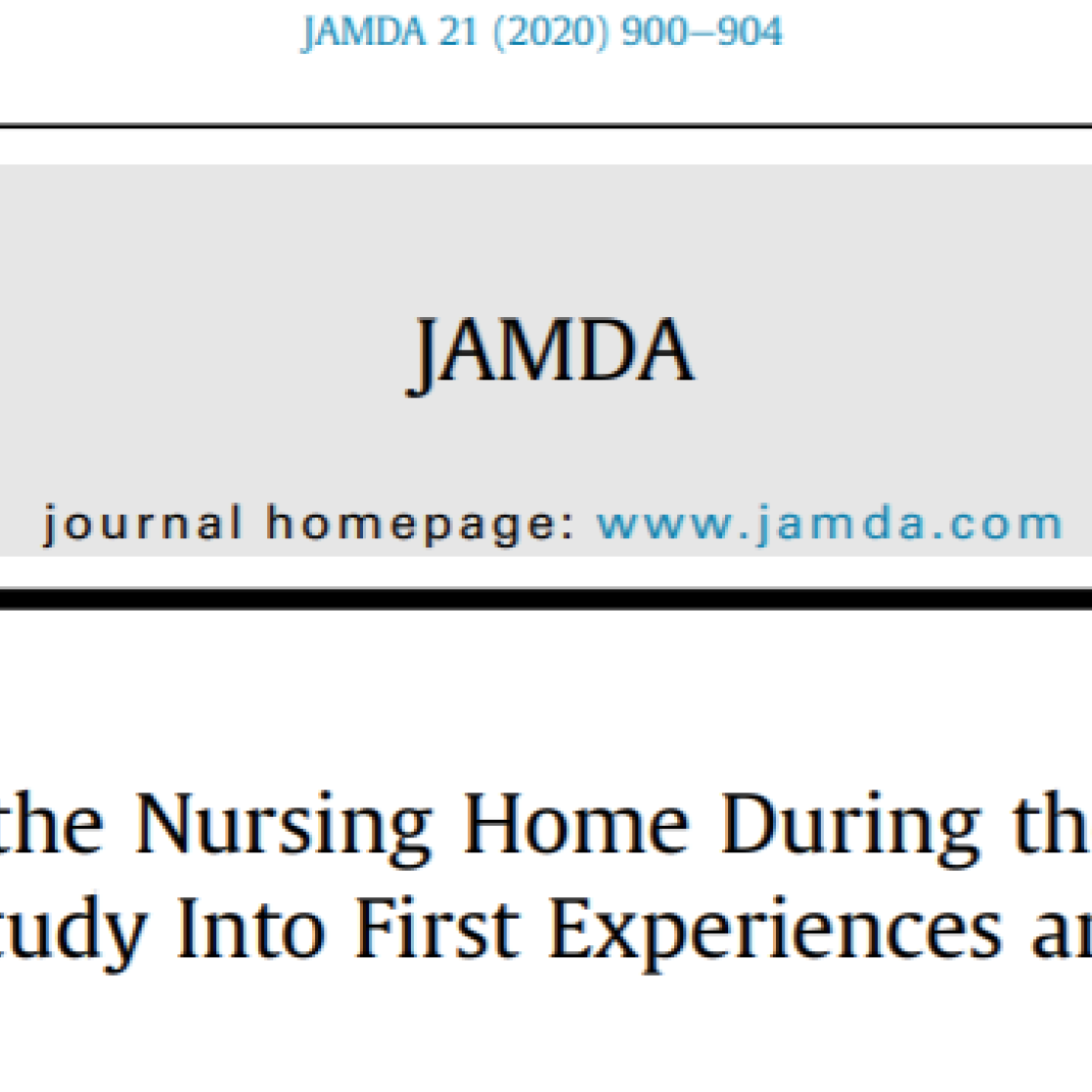
JAMDA 2021 Morley Award
A paper on visitors in the nursing home during the COVID-19 crisis has won JAMDA’s 2021 Morley Award for its relevance and impact on policy and practice in post-acute and long-term care medicine.
Our most important output for societal target groups
- Presentation ‘Impact of COVID-19 vaccinations in Dutch nursing homes. Back to normal?’, Judith Urlings. International workshop on Covid-19 and Long-Term Care Systems, December 2021.
- Presentation 'What we learned from a year of corona', researcher Bram de Boer, nurse Ellen Hermans and family caregiver Fon Kistermann. Online conference ' Figure it out' by Vilans (national centre of expertise for long-term care in the Netherlands), February 2021.
- Presentation 'Monitor study easing of visitation restrictions in nursing homes', researchers Hilde Verbeek and Judith Urlings, nurse Melissa Bettink, Debby Gerritsen (UKON). Day of Geriatrics 2021 (online)
CAPHRI Societal Impact Team Award for research on COVID-19 in nursing homes
The team that investigates COVID-19 in nursing homesmreceived the CAPHRI Societal Impact Team Award 2021 for the great national and international impact their research has had on the well-being of nursing home residents. Thanks to the recommendations from their study, Dutch nursing homes reopened at the end of May 2020 after being closed to visitors for almost two months.
Ramona Backhaus, one of the reseachers, was interviewed about the study. Read the interview here.
